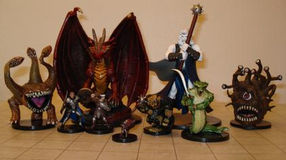Evaluating Our Information: Dungeons and Doomsayers
- Caity Kelly
- Oct 19, 2017
- 3 min read
"Facts are stubborn things; and whatever may be our wishes, our inclinations, or the dictates of our passions, they cannot alter the state of facts and evidence."
-John Adams

The above quote by the second President of the United States boils down to a single piece of advice that is often sadly ignored by countless consumers: “Do your research.”
We often make fun of people who post about ludicrous hoaxes on Facebook without gathering all of the facts first, but it is easy to forget that bandwagons exist everywhere. Dividing lines are drawn between virtually any topic. Before we decide to be swayed by either side’s rhetoric, it is important to assess a few questions:
What are the facts? Is the topic being portrayed dichotomously when the issue is on a continuum? Where are they getting their information?
Although social media had not come into play back then, the 80’s hosted a nationwide panic that perfectly illustrates the necessity of doing one’s own research. Clinical Psychologist and writer David J. Ley discusses this event in fascinating detail in the following article:
https://www.psychologytoday.com/blog/women-who-stray/201404/dungeons-dragons-satan-and-psychology
Role-playing games such as Dungeons & Dragons were becoming a popular pastime for many children and adolescents. Following a tragic youth suicide case, frightened parents formed a group called Bothered About Dungeons & Dragons. This action was followed by a multitude of anti-role-playing-game campaigns, which claimed that the games were toxic to young minds and destroyed an individual’s ability to separate fantasy from reality. The hysteria was further exacerbated by the television/movie industry and—surprisingly—many mental health workers.
Eventually, credible psychologists and the FBI worked to uncovered poorly-done research and faulty inferences created by opposing parties. Many who contributed to the mass hysteria were revealed to be lying about their authority on the subject or guilty of additional malpractice charges. Competent mental health professionals pointed out the lowered suicide rate of individuals who played role playing-games as well as the harm that these groups were causing by encouraging false memories among children during therapy.
As a psychology major, I could not help but cringe as I studied the article discussing this movement. Phrases such as “cherry-picking data” and “causation” are a red flag in this field. We are trained to thoroughly examine sources of information—particularly those claiming that one thing causes another.
Another group that opposed the vehement opposition toward Dungeons & Dragons were the grown players themselves. As a writer and D&D player, I have to agree with their points of view. Contrary to what many believed, these activities are a fantastic way to develop skills such as writing, strategizing, and imagination.
My own skills vastly improved as a result of my participation because it was fun—it was a way to practice these skills outside of essays and logic problems in school.
Regarding the emotional aspect of the debate and the alleged depression role-playing games cause, I have talked about this issue with other players and Dungeon Masters. The DM of my own campaign describes our game as "cathartic"--a way to unwind, escape, and laugh after a long week.
As we now live in an age of constant information bombardment, it is vital that we learn to carefully evaluate what we are told via the internet, the popular press, or simply through world-of-mouth.
The way we learn and develop skills is rapidly evolving with technology. Activities and gadgets that may be labeled as "games" could potentially become valuable tools for the cognitive development of newer generations.
Acknowledgement: Inspiration for the title came from Dr. Ley's article, which you can find linked in this blog post.


Commentaires